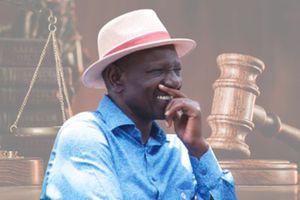Breaking News: Former Lugari MP Cyrus Jirongo dies in a road crash

Chief Justice Martha Koome (left), Deputy Chief Justice Philomena Mwilu (top), Justices Isaac Lenaola and Ibrahim Mohamed. (Bottom row) Justices Smokin Wanjala, Njoki Ndung'u and William Ouko.
The Supreme Court judges, including Chief Justice Martha Koome, have secured another victory in court against the Judicial Service Commission in a legal dispute concerning their removal from office over alleged misconduct.
This is after the High Court in Narok on Thursday rejected JSC’s application to strike out a case filed by a local resident, Pariken Ole Esho, challenging the legality of the disciplinary process initiated by JSC against the top judges.
The ruling came a few days after the High Court in Milimani, Nairobi, declined a similar request filed by lawyer Nelson Havi, who is one of the proponents of the ouster, to strike out the cases lodged by the judges against JSC.
In Narok, the commission wanted the court to set aside the temporary orders that halted the disciplinary proceedings in February this year. It argued that the orders amounted to judicial interference in exercise of its constitutional mandate.
JSC said that Mr Ole Esho lacked locus standi to institute the court proceedings to protect the Supreme judges since the ouster petitions were personal.

The Milimani Law Courts in Nairobi.
Through its secretary Wilfridah Mokaya, the commission also attacked the case on grounds that some documents in possession of Mr Ol Esho and which were used to initiate the court case, were obtained unlawfully and illegally.
The application was backed by the proponents of the ouster led by former Cabinet Secretary Raphael Tuju and lawyers Nelson Havi and Christopher Roasana, who argued that a random member of the public could not sue on behalf of the judge in the context of removal proceedings.
However, Justice Charles Kariuki ruled that Mr Ole Esho had established that he filed the case in the public interest, “being that the general public has stakes in the manner the JSC reviews the petitions filed before it”.
Read: Lenaola: Removing the Supreme Court is tantamount to decimating the Judiciary, killing democracy
“I therefore do not see any legal hindrance to the Applicant instituting legal proceedings in the manner he did,” said the judge.
He added that the Constitution empowers individual persons to sue in public interest to protect or enforce the Constitution without having to demonstrate sufficient interest in a dispute.
“The issue of sufficient interest, the court finds that not even the Constitution of Kenya,2010 interferes with the requirement for an applicant to show sufficient interest with a real nexus or connection with the issue the applicant wishes to be judicially reviewed,” said the judge.
Private and confidential
Regarding allegations of obtaining certain documents illegally and without explanation, the judge said the court could only rule on the admissibility of documents or any other evidence in the course of a trial.
JSC had argued that the documents Mr Ole Esho used to build his case were internal communication, private and confidential documents, and that he had not explained how he acquired the same.
“With due respect, these prayers were in my view misconceived and premature. I say so because a court cannot determine in the context of an application such as the one before me whether or not the documents were lawfully or illegally obtained. This is a matter of evidence that can only be adduced during the trial if Mr Ole Esho actualizes his intention of relying on the said documents as evidence in support of his case,” said the judge.
In addition, Justice Kariuki declined JSC’s claim that the interim orders hating the proposed ouster of judges amounted to the suspension of its constitutional mandate and that the court proceedings were pre-emptive and premature.

The Supreme Court in Nairobi.
He stated that the court orders do not prevent the filing of any future petitions against the top judges or stop the JSC from exercising its mandate.
“The orders issued on February 18, 2025, are clear that it stops the implementation of the decision by the JSC requiring each of the seven Judges of the Supreme Court to submit responses in respect of the three ouster petitions,” he said.
Relating to an argument by the JSC and the petitioners that the case should have been filed in Nairobi, the judge said transferring the case would have been unfair to Mr Ole Esho due to cost implications. This is because he resides in Narok.
“It is illogical and untenable to argue that a Kenyan residing in Narok, Mandela, Lokichogio, etc, in public interest litigation like the instant one must skip the High Courts in their region and lodge matters only in Judicial Review Division in Nairobi to avoid being accused of forum shopping,” he said..
“Why clog the High court at Nairobi yet almost every county in Kenya is being serviced by a High court locally in compliance with Article 48 of the Constitution? My finding is that the access to justice factor tilts in favour of having the cause heard and determined in Narok where the applicant ordinarily resides,” he ruled.











